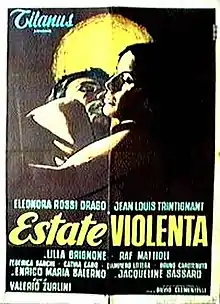Estate Violenta
Estate violenta (U.S. title: Violent Summer) is a 1961 Italian award-winning black-and-white drama film directed by Valerio Zurlini, depicting a love affair between a prominent Fascist's young draft-dodging son, portrayed by Jean-Louis Trintignant, and a naval officer's widow, older than he, portrayed by Eleonora Rossi Drago. It is set in the Italian seaside resort of Riccione in July 1943, around the time of the dismissal of Benito Mussolini, during the Allied invasion of Sicily in World War II. Estate violenta is Zurlini's second feature film, with which he made his name as a director.[1]
| Estate violenta | |
|---|---|
 Theatrical release poster | |
| Directed by | Valerio Zurlini |
| Written by | Valerio Zurlini Suso Cecchi d'Amico Giorgio Prosperi |
| Produced by | Silvio Clementelli |
| Starring | Eleonora Rossi Drago Jean-Louis Trintignant Enrico Maria Salerno Jacqueline Sassard Lilla Brignone Raf Mattioli |
| Cinematography | Tino Santoni |
| Edited by | Mario Serandrei |
| Music by | Mario Nascimbene and Temptation sung by Teddy Reno |
| Distributed by | Titanus |
Release date | 27 January 1961 |
Running time | 98 minutes |
| Countries | Italy France |
| Language | Italian |
Plot
Aged 21 and exempted from military service, Carlo is spending the summer in his father's empty villa and relaxing with friends in Riccione, a seaside town untouched by the war. When a German aircraft flies low over the beach, people panic and Carlo comforts a frightened little girl. She is reclaimed by her mother Roberta, a beautiful widow aged 30 whose husband was a heroic naval officer. Carlo and Roberta are attracted to each other and he asks her out, taking her for a trip to the neutral state of San Marino, though her mother warns her to avoid him because his father is a vicious Fascist party boss and his mother was a promiscuous film actress. Roberta's young sister-in-law arrives as a refugee from the fighting in the south and Roberta asks Carlo's friends to let her join them. They all go to a circus, which is interrupted by an air raid, so Carlo asks everybody back to his father's villa, where in the blackout couples dance. To the music of Temptation, Roberta ends up in the garden in the arms of Carlo and they kiss. When news comes of the fall of the Fascist regime, jubilant citizens sack the party headquarters, toppling the bust of Mussolini, while Carlo's father flees and the villa is requisitioned to house refugees. Carlo and Roberta spend the night making love on the deserted beach, which disgusts her mother and her sister-in-law, who leaves. Meeting again on the beach after curfew, Carlo and Roberta are arrested by an army patrol, who discover that Carlo's exemption has expired but release him on the promise that he will report for service at Bologna next day. On the train he discovers that Roberta has followed him, but the journey is interrupted by an air raid in which their train is bombed and strafed. After they find each other among the dead and wounded, Carlo puts Roberta on another train but refuses to join her.
Awards
- Mar del Plata Film Festival: Best Actress (Eleonora Rossi Drago).
- Nastro d'Argento: Best Actress (Eleonora Rossi Drago), Best Score (Mario Nascimbene).
References
- Biography of Valerio Zurlini Archived 2007-11-14 at the Wayback Machine
External links
- Estate violenta at IMDb
- Estate violenta at AllMovie
- USA DVD information Archived 2007-09-27 at the Wayback Machine